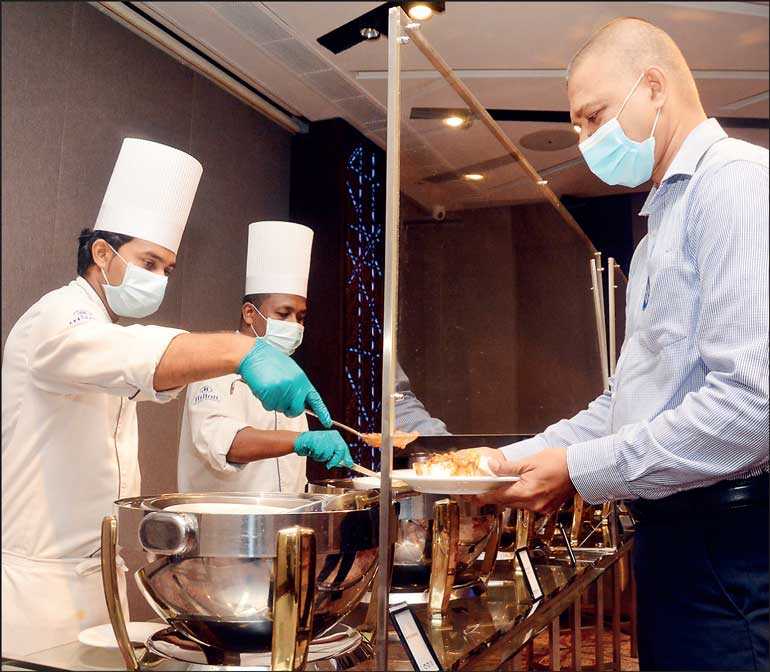Thursday Feb 19, 2026
Thursday Feb 19, 2026
Wednesday, 30 September 2020 00:00 - - {{hitsCtrl.values.hits}}

The service offered to the customer should be purpose-driven. Never do anything that does not add value for a customer. The companies need to understand what customers will value most, post-COVID-19, and develop new use cases and tailored experiences based on those insights. Hence, be ‘hands on’ with what is happening in the environment around and thereby, initiate solutions that fulfil the customers’ current needs – Pic by Upul Abayasekara
The COVID-19 crisis has changed everyone’s life. It will continue to do so as nobody has any solid facts to predict when this pandemic will come to an end globally. Many now believe that we will have to live along with it for some time.
along with it for some time.
We are a country that has comparatively managed the pandemic very well. As a result, we observed over the last couple of months how the lifestyles of our people are gradually regressing to normalcy. Nevertheless, we are yet to experience whether there will be a change in customer behaviour once the moratorium offered by the banks comes to an end this October.
Globally, some think ‘COVID 19’ is not just a virus causing people to suffer or die but a ‘strategy’ in itself. This article will discuss briefly what has to be done in setting up the service culture giving due emphasis to PSR namely; ‘People’, ‘Speed’ and ‘Relevance’ aspects.
People
People are the greatest asset to any organisation at all times. The entities will now have to rethink on their operating model based on how their people work best in the current situation. If a difference has to be made to an entity it has to be initiated with people first. Even a technology-based solution has to be instigated and conceptualised by human beings. Therefore, conceptualise with the existing talent in the organisation what steps have to be taken to strengthen and enhance the service culture in your own outfit during a crisis.
In the process understand the fact that the best ideas need not necessarily come from the top. Formulate either ‘Idea Generation Platforms’ (IGP) or ‘Make A Difference Teams’ (MADT) to come out with some workable ideas that ‘favor action over research, and testing over analysis’. When the staff is given the opportunity to come out with their own ideas, they tend to work with a sense of belonging. This in turn will provoke the staff to achieve cost optimisation which is a prime need of the hour as well. Moreover, there is a self-motivation to their utmost to face the challenges ahead of them when creating value to all stakeholders.
The fashion industry was badly hit with the pandemic. The ‘Make A Difference Team’ of one of the companies was exploring the possibilities of inventing something new. They found a scope to make the business active and get people to feel better by manufacturing Personal Protection Equipment suits and masks of all designs to help customers feel comfortable, safe and stylish. The team suggested a new tagline; ‘One size fits all but not all designs fit all’.
To meet these challenges, every company should craft a talent strategy across the entity to develop its employees. It should take care of developing and enhancing employees in their social and emotional skills, service mindset, critical digital capabilities, adaptability, resilience and efficiency. Now is the time for companies to go all out on their learning budgets and commit to reskilling. Developing this muscle will also strengthen companies to harness its future opportunities. Generally, during and after crisis there is a remarkable drop in overall training expenditures. What this tells us is that if companies cut their learning budgets now, they are only delaying their investment, not netting a saving especially since the current crisis will require a significant skill shift with regard to more service orientation. We have observed at present that State sector entities are showing a keen interest in training their staff after COVID-19. Perhaps it may be due to the vital role that the public sector has to play currently in rebuilding the economy and the country. This goes hand in glove with the President’s mission of ‘Rata Hadana Saubhagyaye Dekma’.
Speed
Everybody will have to be fast and make decisive adjustments to changing circumstances. The speed with which you react to the market need plays a vital role. The decisions have to be made promptly. Our experience was such that many new delivery channels emerged during the pandemic. As a result, today we can get anything from even ‘a pin’ to ‘a jewellery item’ delivered home within a short period of time.
During a crisis organisations should think about the capabilities of both their man power and technology to provide speedy solutions. I took my car for a valuation to De Silva Motors recently. With the increase in demand for vehicles, owing to the current import restrictions, many vehicles were queued up for valuations. The inspectors were conducting their examinations thoroughly and the valuation reports were issued quickly. To me, this was a clear demonstration of the efficiency in both the staff and systems put in place to provide a speedy solution.
Amidst the uncertainty of the lockdown, a friend of mine decided to transfer some of his existing deposits to a different account in the same bank held by his daughter. The daughter’s account was opened 15 years ago when she was a minor. His experience was such that this transaction had virtually taken almost two weeks.
On clarification, he was informed that the delay was owing to converting the daughter’s minor account to a major account. He was questioning; is it due to a policy, process, people issue or combination of all of them? Nevertheless, the undue delay had disappointed the customer. His concern was that while I am living if this was the delay, I had to experience for such a minor matter, imagine what will be my daughter’s plight with this bank if there is a testamentary case when I am no more? The pandemic has accelerated the shift to digital. No point having the best technology in place if it does not put the customer at ease with regard to speedy solutions and convenience. Whilst the best companies are going further, by enhancing and expanding their digital channels, they should always remember to keep in mind that the customer is the centre of attraction at all times.
Therefore, in designing speedy solutions, it is also important to develop a mindset that; ‘Today, is not yesterday’s tomorrow, but tomorrow’s yesterday’
Relevance
The service offered to the customer should be purpose-driven. Never do anything that does not add value for a customer. The companies need to understand what customers will value most, post-COVID-19, and develop new use cases and tailored experiences based on those insights. Hence, be ‘hands on’ with what is happening in the environment around and thereby, initiate solutions that fulfil the customers’ current needs.
In the process continue to identify and prioritise revenue opportunities whilst creating value to the customer. This may include launching targeted campaigns and activities to keep your existing customers with you. Instances such as Cargills Food City introducing a mobile mini super market and banks launching mobile ATMs became so popular amongst people during the pandemic. The mobile communication companies offering additional bonus data on activation of certain packages has a relevance in serving the current customer needs.
The people have begun to realise the importance of the local industries in facing the pandemic and also of the need to build the country’s economy. To what extent have the authorities fine-tuned the approval process to be relevant to the needs of the potential vendors? Moreover, have the banks thought of offering financial packages to such vendors which is relevant to fulfil their needs?
Conclusion
The entities must concentrate on the PSR (People, Speed, Relevance) test in the current circumstances. It is a little initiative to be made by the companies but it can create a significant value difference in providing a valuable service to the customers. In this process the ‘people’ factor will continue to play a vital role in the entity. How ‘quickly’ the business gets adjusted to fulfil customer needs matters next. Eventually, the solution offered should be ‘current’ that fulfils the exact need of the customer.
(The writer is a sought after ‘Service Excellence’ specialist in Sri Lanka. Over the last 25 years he has conducted nearly 3,000 inspirational and educational programs for over 750 organisations in 11 countries. His work can be seen at www.dhammikakalapuge.com)